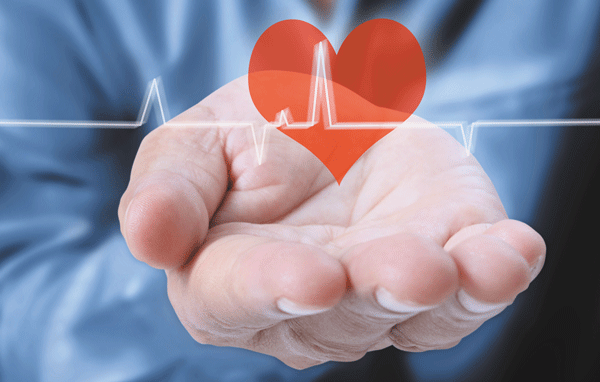
Ever felt your heart is beating too fast or too slow? The chances are that you are undergoing heart palpitations. The impact of heart palpitations can be felt around the chest, neck, and throat.[1]
Since the heartbeat rate increases, it becomes easy to spot the signs of heart palpitations. The heart rhythm changes massively due to palpitations.[2]
What are heart palpitations?
Heart palpitations refer to the process of sensations caused in a person’s heart to die to a hard, rapid, or irregular heartbeat. However, in most cases, a combination of these can also cause palpitations.[3]
You may feel as if your heart is either fluttering or skipping a beat. Heart palpitations can be scary for people, but it is not life-threatening. After a particular time, heart palpitations will themselves go away.[4]
Some of the common reasons you’re suffering from heart palpitations are because you are taking too much stress or having anxiety attacks. Excessive nicotine, alcohol, and caffeine intake can be probable reasons for such palpitations. Most pregnant women also have heart palpitations.
What are the different types of heart palpitations?
Many people have a normal heartbeat, while many of them have an extra beat or two. In some cases though, people may have different variants which can be dangerous, whether they are short-term or long-term. Palpitations from the atrium are considered to be more life-threatening than the ones from the ventricle.[5]
Palpitations are described depending on the beats, frequency, and place of the origin. Sometimes, the heart palpitations can also lead to arrhythmia, so you need to keep a close check to the symptoms.
What are the signs and symptoms of palpitations?
Palpitations are referred to as irregular heartbeat. These may either feel like an isolated skipped beat or would occur frequently. Thus, patients have suggested that palpitations will either be irregular or regular.[6]
Some patients often feel a flutter around their chest.
The palpitations may feel like chest or throat pain. Some of the prominent symptoms of heart palpitations include the following.
- Dizziness
- Fainting
- Chest Pain
- Shortness of Breath
- Excessive sweating
- Nausea
If you have a very fast heartbeat, you will feel lightheadedness, which will eventually lead to the patient passing out or fainting. The causes of palpitations vary greatly; thus, some patients may also undergo syncope in which they actually faint.[7]
As suggested, the reasons for palpitations may vary, so the doctor will prefer analyzing your medical history. Depending on the cause, the doctor will further carry out the treatment.
Sometimes there may not be any underlying cause. Thus, bringing small changes in lifestyle such as stress management can help to manage palpitations.[8]
The Top Causes of Heart Palpitations
The causes of heart palpitations have varied over the years. Although palpitations occur in the heart, mostly, it goes unknown. The causes of non-heart-related conditions include
- Fear, anxiety, and stress, mostly happening during panic attacks
- Rigorous physical exercises and strength training
- Intake of excessive coffee, nicotine, drugs
- Consumption of herbal and nutritional supplements
- Hormonal changes due to menopause, pregnancy, and menstruation
- Abnormal electrolyte level
- Medicines such as decongestants asthma inhalers, drugs to prevent arrhythmia and diet pills
- Anemia
People consuming a high fat, carbohydrates, and sugar diet often suffer from heart palpitations as well. If you have been consuming excessive sodium and monosodium glutamate, you may also be prone to getting heart palpitations.[9]
Heart palpitations may also be a sign of pre-existing cardiovascular disease, mostly indicating arrhythmia.[10] These include
- Heart failure
- Coronary artery disease
- History of prior heart attack
- Cardiovascular valve problems
- Cardiovascular muscle problems
When should you see a doctor?
Although heart palpitations are often thought to be not that serious, you will need to see a doctor under certain conditions. Heart palpitations can also indicate heart problems, so you will need to see a doctor soon. Some of the prominent symptoms, noticing which, you should seek a doctor include.[11]
- Weakness
- Lightheadedness
- Difficulty breathing
- Excessive sweating
- Shortness of breath
- Pain, pressure, and tightening of the chest
- Pain around arms, neck, jaw, chest and upper back
- Loss of consciousness
Diagnosis
Often it may be pretty hard to diagnose heart palpitation causes. Moreover, if you haven’t been facing it continuously, you may not be visiting the doctor’s office regularly.[12]
But, if you are feeling the symptoms, you need to visit the doctor’s office. The doctor may conduct a physical exam and will also ask you a lot of questions. The questions would be mostly based on your diet, lifestyle, stress level, OTC medicines, existing health conditions, use of caffeine, sleep pattern, and menstrual history (for women).
Apart from the verbal examination, the doctor may conduct
- Urine test
- Blood test
- Electrocardiogram
- Stress test
- Chest X-ray
- Coronary angiography
What is the Treatment?
The doctor may find possible causes to determine the best treatment for palpitations. The doctor will further assess the pre-existing medical conditions as well.
Sometimes it may so happen that the doctor cannot find the possible cause. If you are having palpitations because of smoking or caffeine, you need to bring changes in your lifestyle.[13]
Apart from bringing changes in lifestyle, you will also need extra medicines. Thus, you can consult your doctor about the same.[14]
It is essential to maintain a healthy lifestyle if you undergo heart palpitations. Heart palpitations may not be life-threatening, but it can surely turn into one, which is why you need to keep seeing your doctor regularly.
[1] https://www.ncbi.nlm.nih.gov/books/NBK436016/
[2] Weitz HH, Weinstock PJ. Approach to the patient with palpitations. Med. Clin. North Am. 1995 Mar;79(2):449-56. [PubMed]
[3] https://www.ncbi.nlm.nih.gov/pmc/articles/PMC3965874/
[4] Wexler RK, Pleister A, Raman SV. Palpitations: Evaluation in the Primary Care Setting. Am Fam Physician. 2017 Dec 15;96(12):784-789. [PubMed]
[5] Mayou R. Chest pain, palpitations and panic. J Psychosom Res. 1998;44(1):53–70. [PubMed] [Google Scholar]
[6] edrinazzi C, Durin O, Bonara D, Inama L, Inama G. [Epidemiology, classification and prognosis of palpitations]. G Ital Cardiol (Rome). 2010 Oct;11(10 Suppl 1):5S-8S. [PubMed]
[7] Gale CP, Camm AJ. Assessment of palpitations. BMJ. 2016 Jan 06;352:h5649. [PubMed]
[8] https://pubmed.ncbi.nlm.nih.gov/15742913/
[9] Zei PC, Soltys S. Ablative Radiotherapy as a Noninvasive Alternative to Catheter Ablation for Cardiac Arrhythmias. Curr Cardiol Rep. 2017 Sep;19(9):79. [PMC free article] [PubMed]
[10] https://www.ncbi.nlm.nih.gov/pmc/articles/PMC4884607/
[11] https://www.ncbi.nlm.nih.gov/pmc/articles/PMC6076186/
[12] Abbott AV. Diagnostic approach to palpitations. Am Fam Physician. 2005;71(4):743–50. [PubMed] [Google Scholar]
[13] https://www.ncbi.nlm.nih.gov/books/NBK202/
[14] Weber BE, Kapoor WN. Evaluation and outcomes of patients with palpitations. Am J Med. 1996;100(2):138–48. [PubMed] [Google Scholar]

